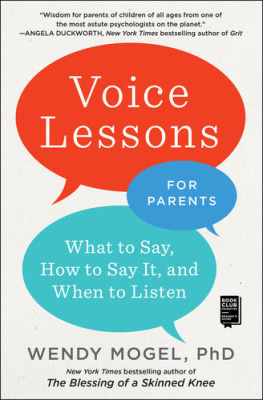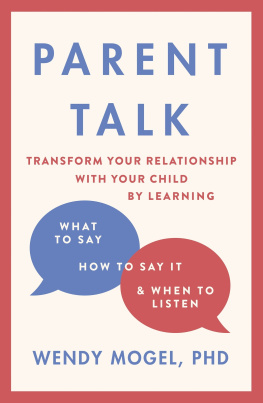The Blessing of a B Minus
Parenting Group Discussion Guide
Ive written this guide to provide parents of teenagers with a framework for discussing the topics of The Blessing of a B Minus in a group setting. Teachers and school administrators can also use the guide to form a group of their own. Talking about your concerns and getting the perspective of peers can be cathartic, reassuring, and eye-opening. Yet parents of teens are less likely to participate in parent education programs or discussion groups than are parents of young children.
I witnessed this reluctance firsthand when I decided to hold my first classes for parents of teens a few years ago. I expected that the classes would be similar to the ones Id held for parents of children in elementary school. The participants would arrive at my office like butterflies, wearing happy colors and alighting gracefully in their chairs. They talked a lot, commiserated, and smiled. We had fun. But when I walked into my first class for parents of teens, it felt as though the lighting had changed in the room. The parents wore darker clothes and darker expressions. They raised their hands to speak, and even when I called on them they didnt speak much. A few of them admitted reasons for their reticence: they were afraid of betraying their teens privacy or worried the others would judge them for having poor parenting skills. After a few sessions, however, the parents discovered how much they had in common, even though their problems looked different on the surface. Once the ice was broken, these parents were movingly honest and very funny. The payoff for overcoming the initial inhibition was a sense of proportion, a deeper understanding of the normal pain of raising adolescents, a feeling of hope, and an appreciation of the power of fellowship.
Despite reservations you might feel about sharing your parenting worries, I encourage you to give a parenting group a try. Here are a few guidelines Ive developed over the years to create strong groups and get the discussion flowing.
NUTS AND BOLTS
Group size is an important element. A group that is too small can devolve into a chat session; one thats too large will lack intimacy. Aim to have ten to twelve members in your group. (If you have a professional leader, such as an adolescent development specialist, counselor, or psychologist, the group can be larger, with up to twenty members.)
When and where should your group meet? The answers depend on the groups composition. Parents working outside of home will be available on weekday evenings; those who have more flexible schedules may prefer to meet in the morning shortly after school drop-off. Weekend meetings are often harder to schedule because they conflict with teens activities and parental driving obligations. An exception to this rule occurs when parents whose children attend Sunday school together form a group of their own. If the school or your synagogue or church can offer you a meeting room, your group can conveniently assemble while the children are in class.
Most book discussion groups are held at members homes. The advantage of rotating among members residences is the distribution of responsibility for hosting and traveling; the advantage of meeting at the same place each time is an ease of navigation and familiarity.
I suggest scheduling an hour and a half for each meeting if you can start promptly, two hours if you want to allow for a brief schmoozing period at the beginning. Consider holding meetings weekly for a predetermined period: six to eight weeks is a typical duration. Of course, you can alter the schedule or extend the group as the members wish.
Groups can also meet in cyberspace via videoconferencing sessions and online discussions. Though face-to-face discussions are always preferable, virtual meetings are a good substitute when in-person groups are not possible.
HOW TO FIND PARTICIPANTS
As I mentioned, parents of teens are often reluctant to discuss their problems. At one high school, the school counselor, desperate to boost enrollment in her parent-education programs, changed the title of her discussion group from Understanding Teen Social and Emotional Development to A Workshop on How to Get Your Child into College: The Impact of Teen Social and Emotional Development. Since few parents got as far as the subtitle, the room was packed. I doubt youll need to employ trickery to find group members, but unless you already know several parents who want to start a discussion group, youll need persistence as well as a light touch. Try submitting an announcement to your school, church, synagogue, or community center newsletter or message board, or post it on a social networking site. You can write something like, Escape from your teenagers! Meet new people with similar problems. Make new friends; sharing of personal stuff is encouraged but not required.... If you are a perfect parent with a perfect child, you are not invited. Or pass a similar e-mail message announcing your group to anyone who has regular contact with parents of teens. This includes school administrators, coaches, private music teachers, tutors, the librarian, the head of the parents association, or the mom in your neighborhood who knows everyone. Ask these people to forward the message to possible group members. Another option is to look for members on Goodreads.com, a book lovers website that offers opportunities for its three million members to form book discussion groups.
LEADERSHIP
Almost everyone knows of a book club in which books are never discussed. If you want your parenting group to have some meat on its bones, consider hiring or appointing someone to lead it. A leader helps provide some structure; structure allows the members more confidence; and confidence leads to a deeper conversation.
If your group elects a moderator from its ranks, the members should grant her the authority to say things like, Weve gotten off track, or Lets hear from someone else now, or Thats a great point. Well talk about it more in a few weeks. A professional leader can perform these services and also offer expertise in adolescence. You can ask a counselor, social worker, or member of the clergy to take on the role. Make sure the leader has experience with teenagers. Although school administrators and teachers can make capable leaders, avoid using someone who works in a school attended by children of group members. (An exception is an exclusively school-based group led by a counselor from that school.) Otherwise the familiarity can make it difficult for parents of teens to be candid.
GROUND RULES
A few good ground rules will keep the group members feeling comfortable and protected. Here are some possibilities for your group.
If the group leader is not in charge of organizational details, appoint someone else to manage this task. This person will maintain contact information, send out meeting reminders, and handle other logistics as they arise. Members should contact this person if they are unable to attend a meeting.
Meetings will be held at a regular time and wont be rescheduled to accommodate the needs of individual members. Group members will do their best to arrive on time and stay for the full meeting.
Group members acknowledge the privacy concerns of both parents and their teenagers; they also acknowledge the honor of being trusted with information about others families. What is said in the group will be kept confidential.
No one is required to share personal information about themselves, their families, or their teens. The group agrees that members can opt to pass out of a discussion and remain quiet without being badgered about this decision by other members.
Members also agree to stay aware of the natural impulse to monopolize the discussion. They will refrain from excessive interruption and attempt to give equal airtime to everyone.
Next page










